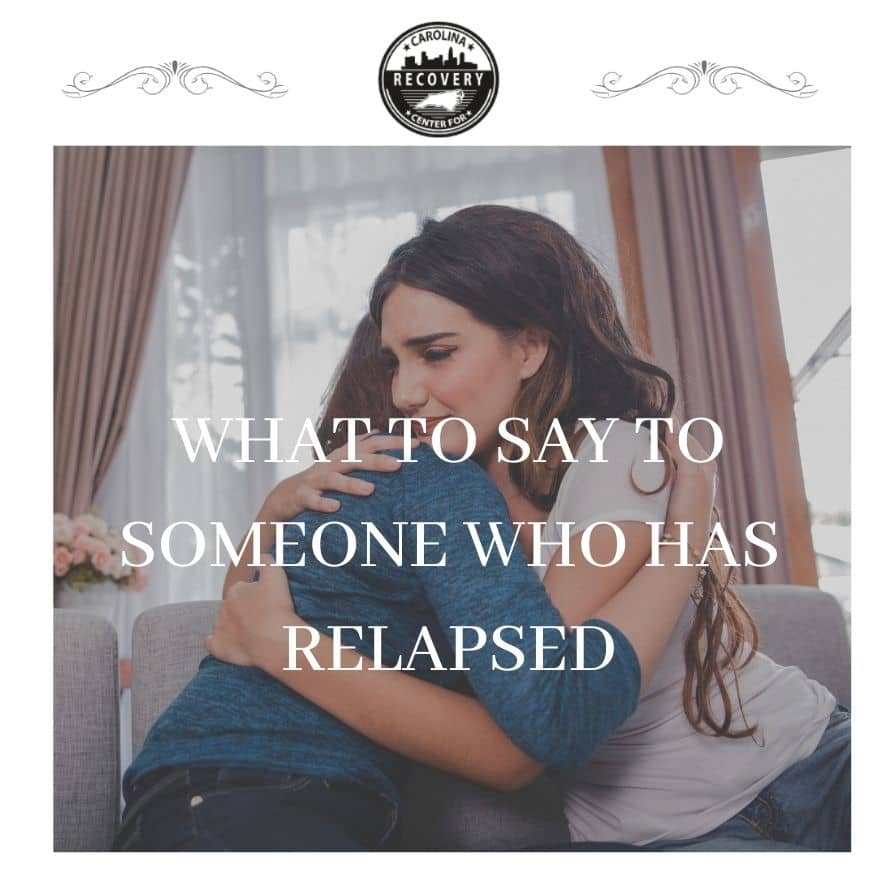What to Say to Someone Who Has Relapsed

Medically Verified: 2/1/24
Medical Reviewer
Chief Editor

All of the information on this page has been reviewed and verified by a certified addiction professional.
Drug and alcohol addiction can damage every aspect of a person’s health and well-being. Getting addiction treatment is a step in the right direction–but the journey of addiction recovery is not always easy.
Relapse is common among people in addiction recovery–even those who go through comprehensive treatment and have ongoing support. Addiction is a deeply-rooted and complex condition, and many people experience setbacks as they navigate the challenges of recovery.
Support from friends and family can be vital to people in addiction recovery. If you love someone in recovery, knowing how to support them best is important, especially when they experience setbacks and challenges.
This guide will explore what to say to someone who has relapsed and how to support people in recovery. Reach out to the caring specialists at the Carolina Center for Recovery to learn more about helping people in recovery or to learn more about our addiction treatment programs.
Recognizing a Relapse
One of the best ways to help someone who has relapsed is to recognize that it has happened. Drug and alcohol abuse can cause significant changes in a person’s emotions, appearance, and behaviors.
Here are some of the signs that a loved one has relapsed.
Their appearance changes
People may lose the ability to care for themselves if they’ve relapsed. Your loved one may not shower or brush their teeth regularly or may keep up with their laundry. A sudden disheveled appearance may suggest a relapse.
Mood changes
A person’s emotional state can impact their likelihood of relapse, and drug and alcohol use may worsen symptoms of an existing mental health problem. If you notice changes in your loved one’s mood, it might indicate that they have relapsed or are at risk of relapse.
Spending time with old friends
During recovery, it’s crucial to identify and avoid your triggers. This means avoiding people, places, and situations that could trigger cravings or relapse. If your loved one begins spending time with people who still drink and use drugs, it may be a sign that they’ve relapsed.
Isolation
If your loved one begins to pull away from supportive friends and family or stops attending recovery-related appointments and activities, they could be amid a relapse. People who relapse often feel guilt or shame about their drug use and may fear judgment from others. They may isolate themselves to avoid having to admit their relapse.
What to Say to Someone Who Has Relapsed
A relapse is a highly emotional situation for everyone involved. The addicted person may feel overwhelming shame, guilt, or anxiety, and their loved ones may feel angry or anxious. While some people may believe that it’s best to confront an addicted person and demand they take accountability, this can cause more conflict and drive a wedge between addicted people and their support systems.
Instead of confronting your loved one or becoming angry, here is what to say to someone who has relapsed.
“I’m here for you.”
Remind your loved one that your love and support are unconditional. People who relapse often feel that they’ve let their loved ones down. They may fear judgment, disappointment, or anger. Reassure them that you are still there to support and help them.
“I will listen to you.”
Your loved one may not feel ready to talk about their relapse. Don’t force them to talk. Simply let them know that you will listen to them without judgment when they are ready to open up.
“A relapse is not a failure.”
Some people feel like they’ve failed after a relapse. They may doubt their readiness to change or believe that they’ll never be able to recover from their addiction. Remind them that relapses are a very common part of recovery. Reassure them that many people who relapse continue to move forward in recovery and that they can, too.
“How can I help?”
Fight the urge to give out advice. Each person has a unique experience with addiction and recovery, and your loved one’s challenges are their own. Instead, ask them what they need. Empower them to identify what would be helpful and take control of their recovery. Listen to their requests and do what you can to fulfill them.
“I believe in you.”
A relapse can be a very humbling or discouraging situation. People may feel that they’ve lost momentum or progress in recovery. Help someone who has relapsed by reminding them they have already proven they can get sober. Your loved one has the tools and skills to recover. Your faith in their abilities may help them believe in themself, too.
“What have you learned?”
A relapse can help people learn about what they need. Encourage your loved one to consider what was happening and how they felt before the relapse. Ask if they’ve identified any needs–for more treatment, additional skills, other kinds of support, or others. Remind your loved one that a relapse is not the end of their journey–just a small bump in the road.
Find Support Now
If you need to help someone who has relapsed, reach out to the caring specialists at the Carolina Center for Recovery. Contact us today to learn more about our treatment programs or to find support at any stage of recovery. Don’t wait to get the help you need–call us today.

